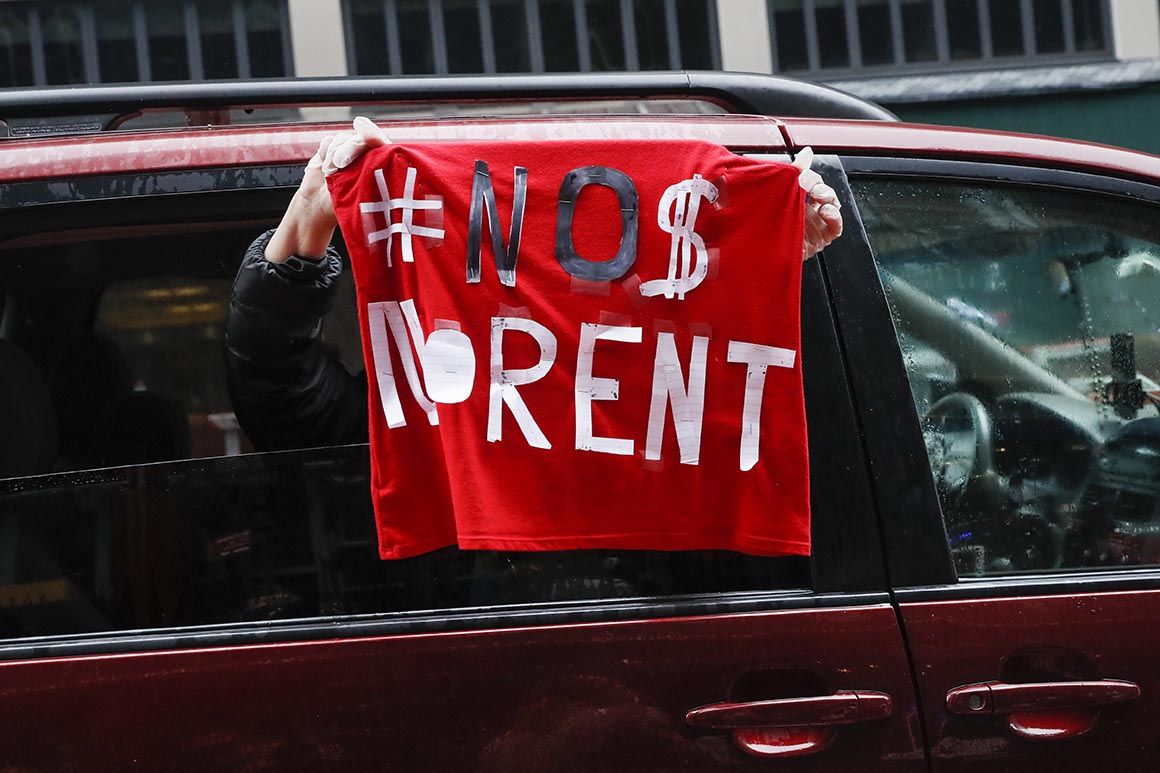
Rep. Barbara Lee (D-Calif.) is seeking an immediate moratorium on evictions for “all types of rentals,” not just those that are federally subsidized.
“We haven’t recovered from the last recession in terms of the loss of one’s home,” Lee said in an interview. In communities of color, “we have a pandemic upon a pandemic.”
The growing frustration among tenants resulted in a series of rent strikes across the nation on Friday, with protesters from California to New York calling on state officials to freeze rents during the pandemic.
But getting federal help to apartment dwellers won’t be easy. House Speaker Nancy Pelosi failed in her attempts to include rental assistance and forgiveness in the last relief package, with Republicans arguing that direct cash payments the government is already offering to millions of Americans could go toward rent.
And merely canceling rent payments — as progressives like freshman Rep. Alexandria Ocasio-Cortez (D-N.Y.) have advocated — would cripple many landlords who pay property taxes to fund things like schools. Even the moratorium on evictions is raising concerns that landlords will be unable to make basic payments, and housing advocates are worried that there will be a wave of evictions once the crisis passes.
Some Senate Republicans like Majority Leader Mitch McConnell, meanwhile, are starting to raise objections to the growing price tag of government relief, setting the stage for more fights over the costs of every assistance provision going forward.
Yet for black and Latino populations the situation is dire, since they are suffering higher rates of hospitalization and death because of the virus. It’s a disparity that National Fair Housing Alliance President and CEO Lisa Rice says points to “multilayered” systemic inequality that has long linked race with location in America, with the legacy of decades of redlining, which is the practice of denying home loans to those in minority neighborhoods.
What’s more, it’s easier to tailor government assistance for people who own their homes because “we already have this huge housing financial apparatus set up around homeowners,” said Zillow senior principal economist Skylar Olsen.
That gives a large advantage to whites: While about 74 percent of white households live in homes they own, only about 44 percent of black households and 49 percent of Hispanic households do, according to Census data.
“White residents are getting a better deal because they’re disproportionately homeowners,” Rice said.
And since owning a home is the primary way most Americans build wealth, the disparity in homeownership exacerbates the gap between the races. The median net worth of a white family was nearly 10 times the net worth of a black family and a little over eight times the wealth of a Latino family in 2016, according to Federal Reserve data.
“It does become self-reinforcing,” Olsen said. “If I have a barrier to homeownership, I don’t have that source to pass on that wealth, I don’t have that equity to draw on during bad times, … it really was kind of primed for a lot of reasons to get worse.”
Fannie Mae and Freddie Mac, the government-sponsored companies that own or guarantee half of the nation’s $11 trillion mortgage market, were created to encourage homeownership. Government support for renters — such as low-income housing vouchers administered by HUD — is paltry by comparison.
It’s also easier to tack missed payments onto the end of a mortgage, Olsen said, to avoid hitting people with massive bills when the emergency has passed.
“The real pain will come back when you have to start paying this back,” she said, since homeowners can modify their loans. “For the homeowner there’s more options — they can design it so that you can pay it back at the end of the term, … but with rent, how would that work?”
National Low Income Housing Coalition President and CEO Diane Yentel also warned that policymakers may be creating “a financial cliff for renters to fall off when eviction moratoriums are lifted and back-rent is owed.”
The black homeownership rate peaked at 46.5 percent in 2007, before a wave of foreclosures from the subprime meltdown sent the rate plummeting to pre-1970 lows. Hispanic homeownership also has failed to return to pre-crisis levels over the last 12 years.
Latinos have made gains since the 2008 recession but those who are U.S.-born — and make up 52 percent of the Hispanic workforce — have not fully recovered, according to a Pew analysis.
“Latinos were the hardest hit of any racial ethnic group in terms of wealth loss during the Great Recession,” said Sonja Diaz, director of UCLA’s Latino Policy and Politics Initiative. “Over the course of the last five years, Latinos have had targeted increases in their share of home ownership in the United States and in fact have been instrumental in increasing the national share of home ownership, [but] any recession associated with the coronavirus threatens that.”
Congressional Black Caucus Chairwoman Rep. Karen Bass (D-Calif.) said she is pushing for “all of the above” regarding rental assistance and eviction halts for the next relief package. And Rep. Brenda Lawrence (D-Mich.), who represents parts of Detroit, is pushing to include a moratorium on utility shutoffs.
Source: politico.com
See more here: news365.stream






